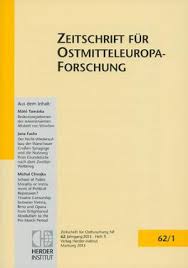„Litauische Libertät“? Zur Rolle kollektiver Freiheitsvorstellungen in der Adelsrepublik Polen-Litauen
"Lithuanian liberty"? The role of collective concepts of liberty in the Nobles' Republic of Poland-Lithuania
Author(s): Mathias NiendorfSubject(s): Law, Constitution, Jurisprudence, Political history, Social history, 16th Century
Published by: Verlag Herder-Institut
Keywords: "Lithuanian liberty"; collective concepts of liberty; Nobles' Republic of Poland-Lithuania;
Summary/Abstract: In the diversifying states of the early modern era, collective concepts of liberty played a significant role. Well-known examples are the "German liberty" and "zlota wolnosc polska" (golden Polish liberty). This article examines why, for the Grand duchy of Lithuania, no such constructs were handed down. We must first note that, in contrast to older concepts, Lithuania was very well able to keep its autonomy in the union with Poland. In order to emphasize this, Lithuania's elites had various choices at hand. First of all, unlike their Polish counterparts, they did not derive their origin from the legendary steppe people of the Sarmatians, but from the Roman patricians. Their historical point of reference, then, were the pre-Jagellonian Gediminids under the leadership of Grand duke Vytautas. Finally, another object of identification was Lithuanian law, whose codification of 1588 was well recognized, too, by the Polish crown. These functional equivalents of a construct of "Lithuanian liberty" (not documented), is what we have to keep in mind when, in some contexts even in the Grand duchy a "Polish liberty" or, more general, a "Sarmatian liberty" was evoked for the Polish-Lithuanian Commonwealth.
Journal: Zeitschrift für Ostmitteleuropa-Forschung
- Issue Year: 57/2008
- Issue No: 1
- Page Range: 52-61
- Page Count: 10
- Language: German

